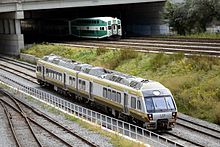Indigo Line
| Indigo Line | |
|---|---|
| Overview | |
| Status | Commuter rail line (On Hold) |
| Owner | MBTA |
| Locale | Eastern Massachusetts |
| Service | |
| Type | Commuter Rail |
| System | Massachusetts Bay Transportation Authority |
| Operator(s) | MBTA |
| History | |
| Opened | 2024 (Proposed) |
| Technical | |
| Character | Surface-level |
| Track gauge | 4 ft 8+1⁄2 in (1,435 mm) standard gauge |
The Indigo Line is a proposed service of the Massachusetts Bay Transportation Authority that could incorporate parts of the former Grand Junction Railroad, the Seaport District's Track 61, a spur to the Riverside station and other MBTA Commuter Rail lines. Although it has been talked about for years, mostly in relation to the Fairmount Line, the line was formally proposed in 2014 when the MBTA released its five-year capital plan. According to the "MBTA Vision for 2024" proposal, the line would operate diesel multiple units for its rolling stock and would be fully operational in that year.[1][2]
Background[]
The term "Indigo Line" dates back to the creation of the Fairmount Indigo Planning Initiative, which proposed transforming the Fairmount Line into a rapid transit commuter rail hybrid line.[3] Most of the infill stations proposed by the initiative have been built, with one more planned; however, the line still uses conventional commuter rail equipment.
Indigo lines under consideration[]

The MBTA Vision for 2024 map shows six possible lines for Indigo DMU service:
- The current Fairmount Line
- South Station to Riverside via the Framingham/Worcester Line and an old right of way from that line to Riverside currently used for trolley operator training
- Back Bay to the Boston Convention and Exhibition Center using Track 61
- North Station to the planned West Station using the Grand Junction Railroad, with a new stop in Cambridge
- North Station to Anderson RTC on the Lowell Line
- North Station to Lynn on the Newburyport/Rockport Line
The Sonoma–Marin Area Rail Transit purchase of Nippon Sharyo DMU trains in 2010 included an option for 18 cars to be provided to the MBTA for the Indigo Line service.[4]
The Indigo Line has since been indefinitely postponed.[5]
References[]
- ^ Annear, Steve (January 9, 2014). "Take A Ride On The MBTA's 'New Indigo Line' In 2024". Boston Magazine. Retrieved March 11, 2014.
- ^ Quinn, Garrett (January 10, 2014). "MassDOT five-year plan includes introduction of Indigo Line, extension of Green Line". Springfield Republican. Retrieved March 11, 2014.
- ^ "HISTORY OF THE FAIRMOUNT LINE". Retrieved March 26, 2014.
- ^ "WES Ridership and Fleet Requirements" (PDF). April 9, 2014. Retrieved October 1, 2014.
- ^ "'Indigo Line' advocates keep pushing for a switch from commuter line to rapid transit".
External links[]
- Proposed railway lines in Massachusetts
- Passenger rail transportation in Massachusetts